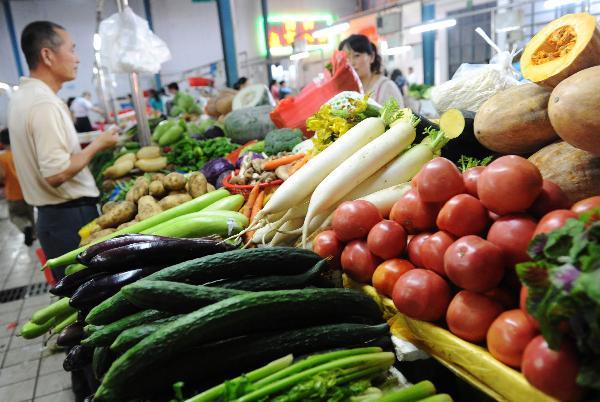 |
| People buy vegetables in a market in Hefei, capital of east China's Anhui Province, Sept. 11, 2010. The consumer price index (CPI) rose 3.5 percent year on year in August, 0.6 percent higher than in July, the National Bureau of Statistics announced Saturday. (Xinhua/Li Jian) |
BEIJING, Sept. 12 (Xinhua) -- China can achieve its inflation target this year through proper management of expectations during the final quarter, despite the August inflation rate quickening to a 22-month high, experts said.
The consumer price index (CPI), a major gauge of inflation, is expected to peak in September as prices of farm products rise, Fan Jianping, a senior economist with the State Information Center (SIC), said Sunday.
In August, prices of pork, vegetables and eggs increased 9 percent, 7.7 percent and 8.3 percent, respectively, month on month, according to the National Bureau of Statistics (NBS).
Apart from farm products, rising labor prices and natural resources costs will push the September CPI higher still to be the peak for the year, Fan said.
Since the prices hike of farm products in August were mainly caused by extreme weather conditions, natural disasters and speculation in several farm products instead of strong industrial demand, they are temporary, CITICS Securities analysts said.
The impact on grain harvests of the natural disasters that hit some Chinese regions this year are manageable, according to Fan Gang, director of the National Economic Research Institute.
The forthcoming autumn harvest, which accounts for about 70 percent of China's annual grain output, will directly influence the inflation figure as food prices have about a one-third weighting in the calculation of the CPI, said Fan Gang.
China's annual grain production has recorded increases for six consecutive years, which means there are ample reserves, Fan Gang said.
Adequate food supply will ease inflationary pressures given international food prices haven't seen large fluctuations despite Russia's ban on grain exports until the end of the year, he said.
Fan Gang also noted that overcapacity in the manufacturing industry is not conducive to inflation.
China's inflation rate quickened to a 22-month high of 3.5 percent in August from a year earlier. It was the second consecutive month the CPI has exceeded the government's full-year target of 3 percent.
Largely on the back of rising food prices, China's July CPI rose 3.3 percent from a year earlier.
China has targeted a 3 percent rise in consumer prices this year, Premier Wen Jiabao said when delivering a government work report at the annual session of the National People's Congress (NPC), China's parliament, in March.
The target takes into account the carry-over effects of last year's price changes, price fluctuations of major international commodities, hefty increases in domestic money and credit supply, and consumers' ability to bear price increases, Wen said.
China aims to strike a balance between maintaining steady and rapid economic growth while restructuring its economy and managing inflation expectations.





